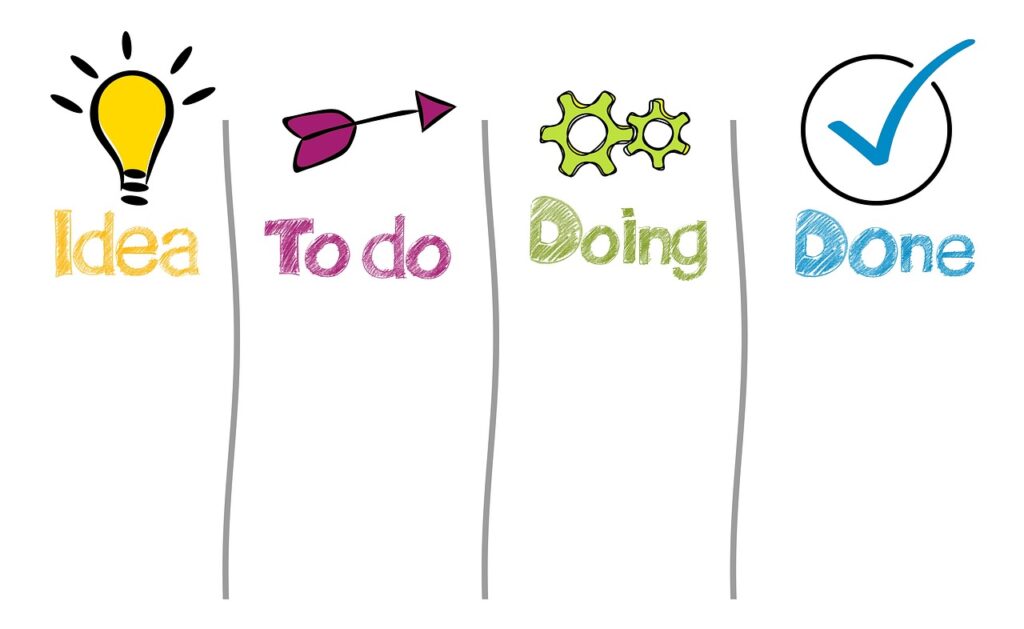Unlocking Success through Effective Time Management in the Workplace
Introduction:


As an employee, you must understand that your employer is paying for 2 things, your time, and your expertise. Part of that expertise is the wisdom to manage your time well, it’s not enough that they pay for your time. they must pay you for being productive in the time you have dedicated to their service.
I do not know much about the work systems that were in place back in the day, but I know this, our world is a little faster than theirs. The nature of our tasks is ever changing.
We have technology to make the completion of these tasks much easier, it also means we generally have more to do. Therefore, time management is not just another skill, it’s a basic need in the world of work.
Time management as an employee, means being able to produce quality work in a fraction of time, without sacrificing your own health and mental well-being. Allow me to share with you tips, tools, and actionable strategies that I believe would be of great help to you.
Common Challenges in Time Management for Employees
1. Prioritization Dilemmas:
We often struggle with prioritization. We seem to have an infinite amount of tasks to complete and it gets really overwhelming. Overtaken by anxiety we wind up mixing up the tasks to be completed.

We tend to misalign our priorities and because sometimes we go after being busy rather than productivity. We end up doing the tasks we find easier to complete rather than the tasks that need completing.
We struggle with setting straight priorities and allocating appropriate time per task.
2. Procrastination Tendencies:
Procrastination is a devil that most of us must fight every living day. We struggle with procrastination for many reasons, it could be because you are easily distracted, or you feel unmotivated.

Whatever the reason, procrastination stands between you and good time management. More like it stands between you and work productivity. If you struggle with procrastination, it means you find it hard to meet deadlines.
When you do, your work is probably rushed and under done. Whenever you are put in a team, they seem to always need to carry your weight for you.
3. Interruptions and Distractions:

Distractions, isn’t it just easy to get distracted these days. There is always something to be attended to. So much work and life administration to be done.
There is an endless list of emails to reply to, endless updates from the social media platforms you are in. There is always another course you should be doing to upgrade your skill set.
Sometimes distractions are so mind consuming, they cause you to procrastinate. Or you unconsciously spend hours and hours on it, and you lose valuable time attending to these ‘light weight matters’.
4. Overcommitment and Multitasking:
Overcommitment is one of the biggest enemies of time management and productivity. Bless our employee hearts because we almost always take up all the projects.

We want to
everything, sometimes we challenge ourselves to the brim of unproductivity. We agree to take up every task, even before we finish the ones we are working on.Sometimes we cannot even keep track of the tasks and projections we must get to because they are just so many.
5. Lack of Clear Goals and Planning:

No goals and lack of planning, for anyone results in zero produce. But planning is far more essential when you are employed. Here is why you are getting paid for your productivity.
I do not care what your argument is, but I say being organized maximizes productivity. Without order, you have no proper workflow and there is no system in dealing with your tasks.
Your results are haphazard, and you have no sense of awareness when it comes to your work. Often success for you is a work of chance not a work of calculated efforts.
6. Ineffective Time Tracking and Estimation:
Sometimes we struggle with allocating time for tasks. Sometimes we add too much per task and sometimes we add too little time. The issue with adding too much time is that the task that was meant to take a short time will end up occupying the time allocated to it.

You set 2 hours for a task that could be completed in 20 minutes, you will be surprised that it will take 2 hours to
it. On the other end, when you underestimate the time needed per task, you gather clouds of anxiety above you.because every minute that passes after the allocated time has passed while you are still doing that task, will unsettle you. The end game to this is, you start rushing the task and taking shortcuts and end up with a substandard quality of work.
The third face to the monster of ineffective time tracking is that you get so absorbed in a project, you end up over doing it. You may be thinking ‘I see nothing wrong with that’, however there is a point when things do not become any grandeur, no matter how much value you add on to them.
Be wise so as to know when that point is. This will help you allocate a fair amount of time per task.
7. Inadequate Delegation and Saying ‘No’:

Sometimes, we overestimate our abilities, we take on way too many tasks, with very little time to complete them. We need to learn to say no when we already have our hands full. understand your limits and capabilities and
not sacrifice yourself on the altar of ‘people pleasing’.8. Resistance to Change and Adaptation:
Change and adaptation can disrupt progress in two ways. One, it can disrupt flow if the staff embraces the new way, and it turns out that it does not work as well as expected or that it has an infinite amount of flaws.

Secondly, change causes disruption, in that some people
not readily welcome change. The resistance may be coming from a good place. You may be skeptical because they not want to disrupt a system you believe is already working just fine.Well instead of being the last person, instead of being the one person that needs a yay big amount of motivation. I encourage you to try the systems first, you may just find they make your job easier.
9. Work-Life Imbalance:

Making part of good time management is being able to strike the work-life balance. However, if it was so simple to live a full life where your job does not interfere, and you still make employee of the year is not that easy. Otherwise, I would not be writing this.
LET’S SPEAK SOLUTIONS
How does one manage their time as a working person and manage to experience life and actually enjoy the money they have earned? Well, first you must be a planner, you must be able to organize your goals, activities, and responsibilities. You must be able to prioritize and decide what is worthy of your attention.

Planning is a clear structure or illustration of how one intends to achieve a goal. The goal is the end product or the desire. There is a tactic of setting goals that comes highly recommended by me, it’s the SMART method.
If you are not familiar with SMART worry thou not, I have got you. If you already know SMART, it’s not a train smash, let’s revise together. The short version of what SMART goals represents is, Specific, Measurable, Achievable, Relevant and Time Bound goals.
Here is a long version of that:
1.Specific – being specific is important, it encourages you to put in the necessary efforts to achieve a goal. What is specificity when it comes to goals? They are goals that answer the question of why, what? When? and how?

For example, what? What is the goal – becoming employee of the month. Why? Increases your chances of promotion. When? you want to get a promotion by the end of the first quarter. How will you get promoted? Try to finish projects earlier, commit to doing a thorough job on the ones you already have.
Right at the point of S-Specific you can see that a plan is coming together.
2. Measurable – now you want to set goals that you can measure, goals you can quantify, this keeps you motivated to continue. You will be able to see how far you have gone and how far you need to go. You need to set a progress rubric, that’s what measurable is.

Measurable can also entail some of the questions asked in the first step. For example, quantifying your goal could be expressed in the WHEN question. You could also come up with a duty list.
In this list you write down all the things that you have done and rate your service. This way you can keep your focus levels high. Better yet, this way you can follow up and see through the goals you have set for yourself.
3. Achievable – again, do not overestimate your abilities and do not burden yourself trying to do the impossible. Set goals that will challenge you, but not destroy you. The goals you set should not be beyond impossible to achieve, that way you will not be discouraged.

You will be inspired to keep going when you hit your mark. Set goals that are realistic, the goals should respect the parameters of human limits. The constraints of time, health, and energy. You will
yourself much good if you do.4. Relevant: – the goals you set should be related to each other and the main goal. When setting goals, you need to keep the main objective(s) in view. What is the goal and where should it go, and then you set steps that lead you there. The idea is to not get distracted. You need to keep your eye on the price.

5. Time-Bound – your goal must have a due date, otherwise you will work on it all your life, unless it is a lifetime goal. However, put up an expectation for yourself, put up a time limit. Deadlines give a sense of urgency and commitment. More than anything, setting a time frame for your work encourages you to work efficiently.

PRIORITIZATION
Growing up has pushed me to understand that the world is such a big place, and a lot happens in it. My life is a speck to the power negative infinity. So much is happening in the world and so many ideas grow over many generational lifetimes.
Which means, I can only do so much, I can only part-take in so much. There is not enough of me to mind all the things my brain gets exposed to. Therefore, I need to choose my battles, I need to prioritize.

It is very important for you to know how to prioritize in your life and at work. You need to pick what is worth your energy and that which is not, it will give you so much productivity and peace.
TECHNIQUES OF PRIORITIZING
Let’s start with the Eisenhower Matrix. The technique works on a personal scale and on a professional level. It’s about writing down the things you ought to do and the things you usually do.
Fitting those activities into category quadrants. The quadrants are broken down this way:
Urgent and important | Important but not urgent |
Urgent but not important | Not important and not urgent |
First quadrant is for the tasks with a pressing deadline, they need to be done! It’s the must be done column, it’s urgent and must go. This way you get the courage to resist the temptation of just doing the things you enjoy doing.
Second quadrant, it is not an emergency to complete them, but they are next in line. If you are very time efficient, these are the tasks you complete before they are on the first quadrant.
Third quadrant is about things that would be nice to do. These are things that you enjoy doing, things that bring you joy.
Fourth quadrant is things that you should not even bother giving your energy too. They are things that waste your time and should never be put on your list.
What I really love about this method is that it raises self-awareness. You get to know what you should spend your days doing and what you actually spend your days doing.
It gives you an upper hand in terms of tracking your time and understanding how to fix your time management flows.
Here are some tips on how to make the Eisenhower technique to work for you:

- Write lists, don’t be afraid and not be weary of writing, it is your superpower. Write to-do lists, write activity lists. This method starts at writing. It is the only way you can classify it, in the Eisenhower quadrant.Write a list of things you need to and a list of the things that you actually do. Then fill up your quadrants
- Do something about it. it is no use to write lists if you are not going to put things into action. Act on the list and make your dreams happen.
- There must be regular reviews. You must scratch things off the quadrant and reshuffle things.
The urgent and the important must quickly disappear and the ones on the important quadrant should fill up the urgent and important.It could as well just be scratched off the list if you work efficiently. This means that you need to keep reviewing the lists and editing the quadrant.
ABCDE Method
This is a method that is coined from the book Eat that Frog by Brian Tracy. It is another method that helps us prioritize better. Like the Eisenhower techniques it classifies things according to importance.
Here is how it works:
A – Tasks:
The A tasks are the important tasks. Tasks that have a significant goal or results. It has a pressing deadline and worst it has dire consequences. These tasks are important, and they demand your immediate attention.
B – Tasks:

The B tasks are very important but not as urgent as those of the A list. They should, without fail, make the second ranking in your list. Remember these tasks are just as important as in the A rank but not as urgent.
C – Tasks:
The C tasks are tasks that
not have a huge impact on your goals and what you dream to do. These are things you enjoy doing, things that inspire you to something. They are optional and should be done when A and B have been taken care of.
D – Tasks:
The D in the D tasks stands for Delegate, which tasks can you delegate to someone to
for you. This is an important list of things as delegating helps you free up your time. This way you can focus on doing the first two or three sub-segments of the list.
E – Tasks:
The E here is for tasks that can be eliminated, tasks that are not a must to do “E” tasks refer to tasks that can be eliminated. They are tasks that do not make part in your progress as an employee or as a person. They contribute very little value to you. In summary they are time wasters.
I am recommending the ABCDE Method because it helps with getting your ideas all down in writing so that you do not miss a thing. You can give order to your dreams, which means you have a system of achieving your goals.
When you use this method effectively, you start completing tasks according to their importance. This helps you to meet all your important deadlines. It helps you to allocate your resources and energies thoughtfully and effectively.
I also like it particularly because of the ‘D’ because it gives the user a chance to delegate. A chance to share the workload with someone thereby freeing up time for yourself.
Here is how you can implement it:
Remember that writing lists is your superpower. Therefore, never give up on writing lists.

- Write lists everyday – may sound daunting, but it is not. It’s a matter of writing the alphabets along the page and then right opposite each letter, you write tasks that must be completed during the day.
- Keep in mind what each letter means and always begin at A, when your energies are still high and running.
- Remember to keep up with your lists. Ensure that you update the goals list regularly so you can feed into the ABCDE To do list. For an easier workflow, the goals list can also be written with the ABCDE rubric.
Scheduling:
We cannot live our lives blindly squandering whatever time we have on earth. We need to be intentional with our time.
That is why scheduling is important. Scheduling is an active effort that we apply to allocate tasks or activities, to portions of time ahead of us. It gives us a chance to decide how our days are spent.
Here is how you could start scheduling:
1. Creating Daily/Weekly Schedules
Creating daily or weekly schedules is a fundamental aspect of effective time management, allowing individuals to plan and allocate their time efficiently to accomplish tasks and achieve goals.

Scheduling is a wonderful way of aligning your daily tasks with larger goals. It helps you to break down the large goal, into tiny, sizable everyday task, here is how you can work the process:
(Please note that my explanation will revolve around planning for the week)
The first and probably most obvious tasks to you right now, must be writing down a list. Write a list of things you should do during the week.This list must be as inclusive as possible, mentioning your work deadlines, most pressing chores, and any other commitments you have got going for you.
Try to write this list in order of priority, it will help you with writing your daily to dos and when writing the ABCDE list and or doing the Eisenhower quadrant.Use your energies to decide – this means the most important tasks should be done, at your best. When you feel your best, those are the times you need to assign important tasks.

Allocate time slots – scheduling works with specificity. At what time
you want to start working on a certain project? How long you think that the project will take before you get desired results? When will you take breaks? And what time you want to stop working on this task?Include a go between time – this means that when you schedule things, remember to add time for a disturbance or a delay. You should include time for unforeseen interruptions. This will decrease your anxiety and help you keep a high standard to the quality of your work.
Adjust the Schedule – you must keep an open mind when it comes to scheduling. You must know that unforeseen things happen that compel a change of schedule. Tweak the schedule as you move along, however do not do it under the influence of procrastination.
Practice time blocking – time blocking is about working in time intervals. Ideally 25 minutes of undisrupted work and 5-minute breaks.
Batching similar tasks – this is meant to inspire your to do list writing. Its grouping similar tasks and putting them together. Then you can easily transition into doing the next thing. This helps also with scheduling, because you can add similar activities into the same block of time.
Avoiding Procrastination
The Greatest enemy for all employees out there is procrastination. In fact, the greatest enemy to productivity is procrastination. Procrastination is the act of postponing tasks,this seemingly unharmful act is detrimental to progress. It causes a backlog and increases work stress. I bet you do not want to always be catching up with your work.

It is best to always be on top of your work. To be on time or even early for your due dates would make you a valuable employee.How
you Know that you struggle with procrastination? Here are some habits that express procrastination:- You delay doing important tasks and you reason that you can do it later and quicker.
- You have a lot of excuses for why you cannot do your work
- You take up new tasks before you complete the ones you should be doing. Essentially you distract yourself so that you do not have to do your work
- You always work at the last minute, just before the deadline hits, that’s when you get into a frenzy and start working.
When procrastination is such a bad thing, do you ask why we still do it? Well, there are a numerous number of reasons why that is. Some of us fear failing, and others are perfectionists, some lack motivation and others too often feel overwhelmed.
How do We Overcome Procrastination?
- Use the scheduling techniques that I added in this article.
- Set clear goals and deadlines.
- Use the two-minute rule, which means if a task takes at most 2 minutes, then do it right away. This way you will avoid accumulating tasks.
- Manage your distractions, make sure your workspace is free of distractions.
- Reward yourself for your efforts.
Conclusion
I know that I have said a lot in this article, and you are probably struggling with where to begin. Starting new habits is not easy but you need to start by starting at the very beginning.
Start acknowledging the things you need to do and then planning out your days. Most importantly you must cultivate an attitude of growth, you must want growth for yourself.
Be patient with yourself because beyond reasonable doubt you will falter and go back to your old habits but it’s not the end of the world. If you have grace for yourself, you will be able to love yourself back to trying again.
Once you have started remembering that the vision is consistency, to keep it up until it’s a lifestyle. Be consistent. Discipline does not come overnight, you work for it. tirelessly and with each effort you are a step closer to it than when you first began.

